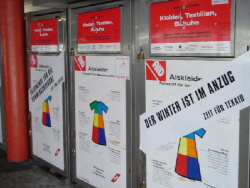CHARITY – A CAUSE FOR CONFUSION…
Choosing to live in a foreign country results in having to face challenges and changes. The familiar comfort zone has been breached and efforts are made to embrace the new community one is entering into. Some attitudes and customs may be difficult to understand. One such subject is Charity, and has led to some awkward conversations and confusion.
When one thinks of Charity and Switzerland, the organisation that normally comes to mind is the International Committee of the Red Cross, which was established in 1863. It is at the origin of the International Red Cross, Red Crescent Movement and of humanitarian law, notably the Geneva Conventions. Its headquarter is in Geneva. It is an independent, neutral organisation ensuring humanitarian protection and assistance for victims of war and armed violence.
It is a charitable organisation that has been involved in some historical relief campaigns and attracts global attention, deservedly so.
More details can be seen on www.helpicrc.org.

The late Diana, Princess of Wales visited Washington DC (U.S.A) on 17&18 June 1997 to promote the American Red Cross landmines campaign. She also spent time working as a British Red Cross volunteer in Angola in January 1997, which attracted scepticism but resulted in bringing the world’s media to report on shocking scenes. Her last public engagements were during her visit to Bosnia from 7 to 10 August 1997, when she visited landmine projects in Travnic, Sarajevo and Zenezica.
These are examples of high profile organisations and people, but what happens at a more local level within the community?
I am from a culture of fund raising events held inside and outside school and work environments. This does not mean that culture was anyway superior then the one I moved to, but was different.
How can ex-pats contribute towards the local community, take part in voluntary work, fund raising events, and make donations to local charities?
Personal opinion: there is only one local community. When we talk of separate communities for each different set of foreigners this can be divisive and has the potential to lead to mistrust and misunderstanding.
During my first year in Switzerland (Zürich), I naively asked a work colleague, what I thought was an innocent question, “ Are there any Charity events organised in the office?” A strange silence followed prior to an awkward, formal reply, which was out of character for that particular Swiss national who spoke fluent English. I cannot remember the exact words, but was told that Charity was a private matter and these events do not happen in the office.
As I was new, I did not want to rock the boat too much and remained confused. There was a sale of local Charity Christmas cards, later that year in the same office, which I thought was a nice gesture and was popular amongst a lot of members of staff of all different nationalities.
After the devastating Tsunami on 26 December 2004, I attempted to help the Goods for Goodwill Charity project. There was much enthusiasm within the group of multi-national volunteers but sadly the same cannot be said for the people we tried to reach out to. For example, many emails were sent seeking advice, help etc.. but received few replies. I respect adults have the right to choose and say, “I would prefer not to be involved in this project, etc…” but remain confused at no acknowledgement and no time for good luck messages.
The website www.swissinfo.org states that the Swiss Solidarity Charity raised approx CHF130 million for the Asian Tsunami which is a generous gesture.
There is the option to donate clean clothes, material, and shoes in the Tex-Aid containers. Tex-Aid plastic bags are sent by post and details provided of collection dates etc..More details can be seen on:-www.texaid.ch

Tex-Aid containers in Letzipark Einkaufszentrum, Zürich)opposite main entrance.
There are Salvation Army centres throughout Switzerland. In Zürich (for example) there is one shop at Geroldstrasse 29, 8005 Zürich hardbrücke where goods can be donated or bought. Details can be seen on:-
www.heilsarmee.ch
www.brocki.ch

Some people are cynical of Charity and view it as another form of taxation. Press reports of Charity fatigue are common as there are many different demands for donations. There are corrupt global organisations and governments that have taken donations made in good faith to charities. It is easy to give up hope. It is also confusing for people when they witness year after year, what appears to be the same countries in poverty.
I have witnessed scenes of starving children from Africa on T.V. for approx. 36 years and it can be confusing to the ordinary person in the street as to why this situation does not seem to improve. Geldof in Africa was an honest, disturbing, sad but much needed BBC TV series that provided an insight to some of the problems facing Africa by Sir Bob Geldof. Reference was made to the Four Horsemen of the Apocalypse i.e. War, Famine, Pestilence and Death. The general public may grow frustrated at the continued cries for help from one continent but how can any place on planet earth face famine in a world of plenty in 2006? There has been tremendous work carried out by humanitarian organisations, volunteers, and people living in Africa but the odds are stacked against them whilst the world asks why? The level of conflict has been devastating and children are recruited, often by force, into armed groups either as child soldiers, porters, or sex slaves. Education will play a major role but it is impossible to educate children who have been abducted and it will be a slow process to break the vicious cycle of those children traumatised by war. The spread of HIV/AIDS has torn apart local communities and placed an even bigger burden on young children if their parents have either died or are seriously ill.
Personal opinion: The Roman Catholic Church is one the richest corporate organisations on the planet and they will not officially condone the use of condoms even though millions of people each year (predominantly throughout Africa) are infected with HIV. There have been news reports recently that allegedly the Catholic Church will review its guidelines on the use of condoms and I sincerely hope they can make a smart decision very soon. Yes, it would be naïve to think this one decision would prevent the further spread of HIV but as The Roman Catholic Church has a major influence on the global stage this would be a giant step towards saving millions of lives and providing children with a chance to be children and not fight to be providers and carers for their families.
The ex-president of the U.S.A., Bill Clinton, has worked hard on finding ways on how the world can tackle the problems of HIV/AIDS and most importantly ensuring that this topic is kept in the global arena for discussion.
More details can be seen on: www.clintonfoundation.org
Concern is also expressed that celebrities exploit Charitable causes for their own financial gain e.g. the motivation for pop stars to play at concerts such as Live Aid is fuelled by the hope that their record sales will increase after the event. Some global corporate companies are aware that it is good for their brand image to be seen to sponsor a charitable cause. To balance this argument, one has to accept that some celebrities are driven by tragic events that have taken place in their own life and are determined that no one else should suffer the pain they have witnessed or experienced.
I am extremely grateful that I have witnessed positive results for those, involved in fundraising events, those who made donations and for those in receipt of the money. If one looks at the example of Sports Relief, a U.K. Charity, the main event is due to take place on Saturday 15 July 2006. The request is that the participants cover the Sports Relief Mile according to their ability e.g. walk, run etc. and get sponsorship from family, friends, work colleagues. This is primarily promoted as a fun event raising money for much needed causes throughout the U.K. and global charities. But what it also offers is a way for local communities to pull together. Elderly, young, able-bodied, disabled, different religious groups and families in fancy dress can all take part and feel united. No one project is perfect but this is a good example of the benefits of charitable acts.
Fundraising events have the potential of creating a fun team spirit and help ex-pats feel they are involved in a multi-cultural event and community. The language barrier may cause some problems for new ex-pats but taking part in local voluntary work may be what is needed to help feel connected.
The website: www.freiwillige.ch provides more information and links to other websites, which may help introduce you to as relevant group.
For those experiencing troubled times there are confidential help line (similar to the Samaritans) telephone numbers which may provide people with some additional choices: -
Telephone number: 143.
www.143.ch.
Help line telephone number for children and young people: 147
www.147.ch
During my research of this subject I have come into contact with many varied interesting people of different nationalities and it has led to an inspiring exchange of opinions.
One person told me: -
“I just wanted to write to you as a Swiss citizen. Here people have a completely different approach towards charity that is very private. The Swiss are the world’s highest donors but will not to my opinion like charity shops etc. We really do not want to take over the complete Anglo-Saxon lifestyle and that should be a thing that needs to be said openly without anyone taking offence. So if expats want to organise things like that in their community that is fine but I do not think our local people would much appreciate it. Every country has its culture and especially in private matters like whom they donate too, I personally believe people here will not go for things like that. Now do not take this as that I am against charity…….” (April06)
I also discovered that one ex-pat managed to organise a Charity quiz night, which raised approximately CHF5, 000 which was a fantastic achievement. The ex-pat obtained support from local Swiss companies, which was positive and some of these companies donated high quality products/services for the Charity raffle. These contributions were obtained through a lot of hard work and effort and being brave enough to telephone the companies after sending the initial request letter. It is an inspirational story and provided hope that these types of Charity events can be organised.
Charity shops offer benefits for specific causes, for the community and the voluntary workers involved. I worked voluntarily for a Cancer Research Charity shop, in the U.K, during 1996. It was a Saturday job whilst I continued my full time employment from Monday-Friday. I cannot state, as a fact, that my contribution made an impact on the Cancer Research campaign but it provided a service for the local community. Some of the other voluntary workers were retired people who still wanted to actively contribute towards the community. This may have provided them with a way to cope with the loneliness they may have felt, at times, and it certainly helped me feel part of the community. During my time there we found a way that another local shop could contribute clothes and shoes (end of lines) to the shop and it made a connection between the two teams. Some times people do go through financial challenging times and a Charity shop can provide an alternative method of buying good quality clothes, books, toys etc… It also provides a fun way to buy clothes for Fancy Dress parties, children’s parties (games etc.) etc. and a good place to hunt for antiques.
Charity does not only raise finance but plays a critical part in raising awareness. Please may I introduce you to a Swiss Charity called Castagna that offers counselling and support for victims of sexual abuse. Castagna helps women and children and more details can be seen on:-
www.castagna-zh.ch

Sexual abuse, domestic violence, rape etc.. are not subjects that people may feel comfortable discussing but it is critical that people do not suffer in silence. One of the main weapons in breaking the vicious circle or breaking the old chestnut is by speaking out. It is a terrible ordeal for victims to seek help especially if the sexual abuse is happening within the walls of the family home. Their abusers tell some children that if they tell anyone, the family will be split up and it will be their fault entirely. What a burden for a child to carry. But if it were not for all those victims of abuse speaking out against the members of organised religious organisations that got away with physical and sexual abuse for decades, little would have changed. The predators hid behind the perceived safe mask of a trusted organisation within the community. Everyone could trust a member of that religious group, couldn’t they? Also, if a child attempted to tell of sexual abuse by an adult, especially a priest or social worker etc.. the community would have believed the adult and dismissed the child as having an active imagination.
My views are not determined by my nationality or by a religious organisation but my own human belief system. As a free democratic society, it is important such discussions take place as this helps break down barriers.
How many of us will turn away if we witness or hear of domestic violence? No one likes to interfere in other people’s personal lives but it is easier to turn a blind eye rather than try to help.
The “Gender Gap Index,” a survey of 58 countries worldwide published by the World Economic Forum for the first time in 2005, put Switzerland in 34th position, far behind most Western European countries. Although it did well for women’s health and well being and relatively well for political empowerment, it had much worse scores for women’s economic participation and educational attainment. Nordic countries took the top five places in the index.
More details can be seen on www.swissworld.org
If anyone has heard of John Walsh, in the U.S.A, you will know the tragic way his son was abducted and murdered. He is a tireless advocate for victims’ rights and missing children and uses the TV show “America’s Most Wanted” as his vehicle for justice. John Walsh has stated on the Larry King Show on CNN that sexual predators no longer have to wait by the school gates, in the park etc.. as the Internet proves a far more efficient weapon in their armoury. Many children get trapped into a false sense of security in chat rooms and their predators entice them to meet them. More details in respect of John Walsh can be seen on: -
www.amw.com.
Unfortunately, many people believe that if we do not talk about these problems they will go away but sadly this is not true.
There are stories that some people used to refer to Cancer as the ‘Big C.’ People lived in fear that if they said the word Cancer they would contract the disease. With most diseases prevention is better than cure and our lifestyles can increase the chances of developing certain Cancers.
More details can be seen on: -
www.cancerresearchuk.org
I respect that some may prefer to keep their charitable donations private. Not everything in the local communities is private e.g. there are units in shopping centres that sell items for Adults that are explicit in nature and are not hidden from children’s innocent eyes. The fashion style of some who attend The Street Parade, Zürich (12Aug06) could be described as adventurous or risqué to put it mildly. This irony can lead to confusion.
No one person can save the world but each and every one of us can make a difference. Because someone is an ex-pat does not mean they have to be excluded from the local community.
© Theresa Avery. May 2006
GIVE US YOUR FEEDBACK/THOUGHTS/COMMENTS ON THIS ARTICLE:
This email address is being protected from spambots. You need JavaScript enabled to view it. your feedback on this article!






